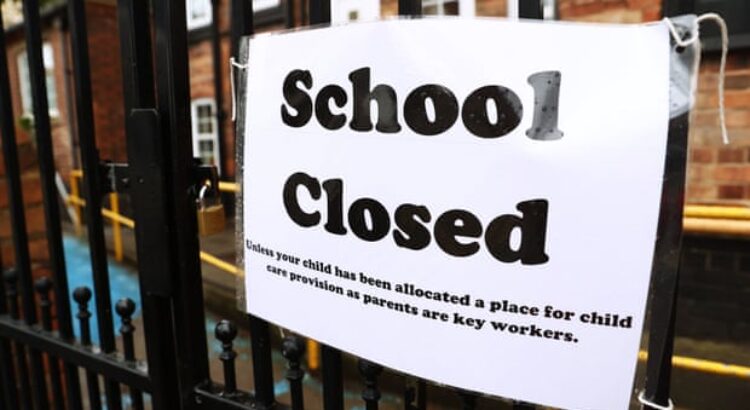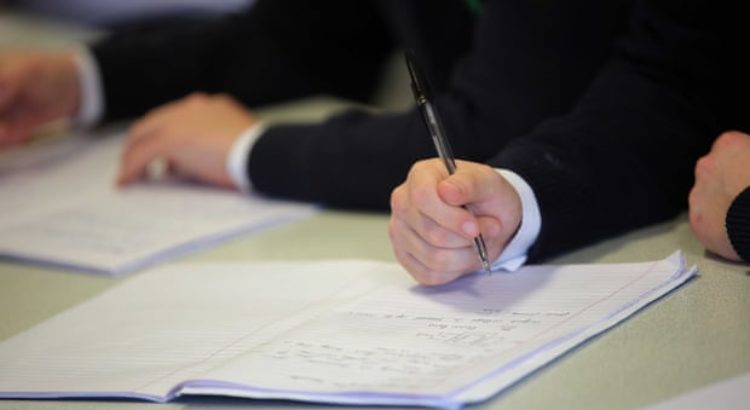By: Sally Weale.
Government plans to reopen schools in England face a mounting backlash from education unions, who say the proposals are not feasible and have advised teachers and support staff not to “engage with” preparations for a 1 June return.
The Department for Education (DfE) wants children back in primary schools in a phased reopening starting next month, with class sizes limited to 15 and a staggered timetable to limit the number of pupils and risk of transmission.
The education secretary, Gavin Williamson, has held regular meetings with sector leaders to try to keep teachers onboard, but relations appeared to be fraying on Tuesday with unions complaining they were not consulted on the 1 June return date or the year groups chosen to return first.
The National Education Union (NEU), which represents 450,000 teachers and other school staff, and the public service union Unison, representing school support staff, told members not to engage with planning for reopening on 1 June.
The shadow chancellor, Anneliese Dodds, meanwhile raised concerns about the potential safety risks. Speaking on BBC Radio 4’s Woman’s Hour, she said: “I would be more than happy to send my own child to school if I knew that by doing so I would not be potentially harming others. That’s the critical issue for me. And we don’t have that evidence, I feel, currently.”
The government has said it wants children in reception, year 1 and year 6 to be back in school first, with other primary years joining later, but headteachers have raised concerns about problems with physical distancing for younger children and health risks for pupils and staff.
Kevin Courtney, NEU joint general secretary, tweeted to members: “Education unions intend to work together. Don’t engage with planning a June 1 return to wider opening – await further union advice.” Schools are currently closed to all pupils other than children of key workers and vulnerable pupils.
The NEU says that, under health and safety legislation, any employees – including teachers – are protected if they believe they will be exposed to a serious and imminent danger should they attend their place of work.
“If such a situation does arise in a school or college, our members will continue working from home as they have been over the last six weeks,” the union said.
Patrick Roach, general secretary of the NASUWT teaching union, agreed there could be no compromise on health and safety.
“If this means that schools are unable to open safely before September because they are unable to make arrangements to safeguard their staff and pupils, then that position must be accepted.”
Geoff Barton, meanwhile, who is general secretary of the Association of School and College Leaders, described government ambitions for school reopening as “frankly unfathomable”.
The government also appears to have some way to go to persuade families it will be safe to allow more pupils after an NEU poll of 1,000 parents found that fewer than half (49%) would be prepared to send their children back as soon as schools reopened and a third (33%) would delay their child’s return.
Paul Whiteman, general secretary of the National Association of Head Teachers, told MPs on the education select committee on Tuesday that primary schools would struggle to accommodate classes of 15 with physical distancing requirements.
“Our members are telling us that their building sizes on average would only accommodate classes of 10 to 12, rather than 15,” he said.
“So straight away we’re getting into some real practical difficulties about whether the government’s ambition can be practically accommodated. Let alone all the fears that parents have about bringing their children back into school, and the fears of the workforce too.”
Williamson said: “The latest scientific advice indicates it will be safe for more children to return to school from 1 June, but we will continue to limit the overall numbers in school and introduce protective measures to prevent transmission.
“This marks the first step towards having all young people back where they belong – in nurseries, schools and colleges – but we will continue to be led by the scientific evidence and will only take further steps when the time is right.”









 Users Today : 25
Users Today : 25 Total Users : 35459620
Total Users : 35459620 Views Today : 60
Views Today : 60 Total views : 3418032
Total views : 3418032